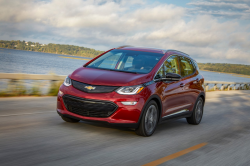
— A Chevy Bolt fire recall has caused a car owner to file a lawsuit alleging the Bolt recall is causing him "range anxiety."
Illinois plaintiff Andres Torres purchased a 2017 Chevy Bolt in August 2019, but in November 2020 the plaintiff was notified about a Chevrolet Bolt recall of about 51,000 model year 2017-2019 cars in the U.S.
General Motors issued the Chevy Bolt fire recall after the automaker received 12 claims alleging the high-voltage batteries may have caused fires.
GM worked with the battery pack supplier, LG Chem of Korea, and confirmed five of the 12 claims appeared to be related to the batteries, although no root cause for the fires had been found. However, four Bolt fires occurred when the batteries were fully or nearly fully charged.
GM says the Chevy Bolt fire recall will occur in two stages as GM and LG Chem try to determine the root cause of the fires. As part of the interim recall repairs, GM dealers will install software that will limit the battery capacity to 90% until a final remedy is available.
This decreases the Bolt estimated range of 238 miles on a single charge to about 214 miles.
According to the plaintiff, he took his Bolt to a dealer for the software update, but the estimated range "was drastically less than the range of 238 miles that Plaintiff Torres expected he would be getting when he purchased his vehicle."
"The software patch installed on Plaintiff Torres’s vehicle reduces the range of the vehicle. Plaintiff Torres is concerned about the range falling even further during the cold winter months in Illinois and Wisconsin, as he currently cannot turn the heat on to and from work in order to make it back and forth to work. Prior to installing the software patch, Plaintiff Torres was able to use the heat in his car to and from work." - Chevy Bolt lawsuit
The plaintiff argues GM didn't inform him of the alleged battery fire risk when he purchased the Chevy Bolt, nor did the automaker tell him the "fix" would reduce the range and battery capacity.
According to the class action lawsuit, the Chevy Bolt fire recall should have included replacing the batteries instead of GM announcing an interim repair that decreases the driving range of the cars.
The Bolt lawsuit also alleges the automaker has known about battery problems since at least 2017 but concealed the alleged defects from consumers.
Chevy Bolt Fire Recall Issued After Customer Satisfaction Programs
GM issued a customer satisfaction notice in April 2018 for drivers of 2017 Chevrolet Bolts to get software updates to allegedly provide more warning about any potential “cell low-voltage condition” and reduced propulsion.
And in May 2018 GM said Bolt owners should get their cars to dealerships to receive software updates that would increase "the accuracy of the range estimation, in addition to providing more warning at low states of charge.”
Then in August 2018, GM issued another service program:
“Certain 2017-2018 model year Bolt EV vehicles may have a condition where the software will not detect the difference in the state of charge between the cell groups of the battery and over predict the indicated battery range. The current software may not provide sufficient warning prior to a battery cell low range condition, which may result in a loss of propulsion. Only certain vehicles will experience the battery low voltage cell condition.” - Customer Satisfaction Program 18125 / Loss of Propulsion High Voltage Battery Without Notification
In addition to the dangers associated with the Chevy Bolt fire recall, the class action lawsuit alleges GM overstates the battery capacity by advertising a capacity of 60kWh even though the label on the LG Vista 2.0 battery module allegedly says the capacity is 57kWh.
The Chevy Bolt fire recall lawsuit was filed in the U.S. District Court for the Northern District of Illinois: Torres, et al., v. General Motors LLC.
The plaintiff is represented by Barnow and Associates, P.C., Chimicles Schwartz Kriner & Donaldson-Smith LLP, and Wittels McInturff Palikovic.




